In today’s fast-paced B2B landscape, companies often grapple with fragmented systems, manual processes, and operational bottlenecks, leading to lost revenue, inefficient workflows, and dissatisfied customers. The global B2B e-commerce market, valued at $18.7 trillion in 2023, is projected to reach $57.5 trillion by 2030, growing at a CAGR of 18.3%.
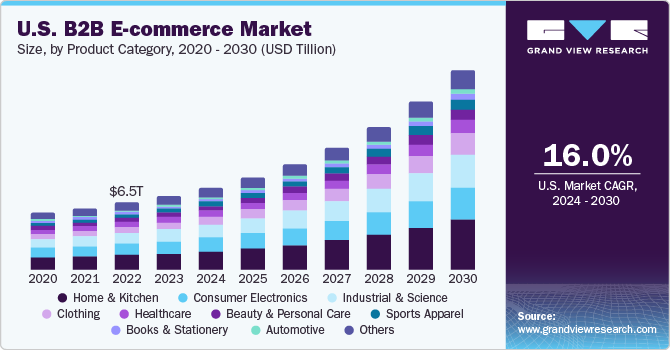
Integrated eCommerce platforms are changing the game by connecting all your systems into one smooth operation. This means data flows easily between departments, cutting down errors and speeding up processes. The result? More efficient operations, happier customers, and a boost in revenue.
In this article, we’ll dive into the top benefits of integrated eCommerce platforms and how they can transform your business. With Atwix by your side, you can tap into these advantages—whether you’re aiming to automate tasks, scale up, or understand your customers better.
What is Integrated eCommerce?
Integrated eCommerce is the seamless connection of different business systems—such as ERP (Enterprise Resource Planning), CRM (Customer Relationship Management), inventory management, and payment gateways—into one unified platform. This ensures that data flows effortlessly across departments, allowing businesses to make better decisions, reduce manual work, and streamline operations.
How Does Integrated eCommerce Work?
Imagine a customer places an order. With a B2B eCommerce integration, the system automatically updates inventory, triggers fulfillment, and syncs financial records—all in real time. This eliminates errors, saves time, and keeps every department in sync.
🔹 No manual data entry – Order details update instantly across systems
🔹 Real-time inventory tracking – Prevents stockouts and overselling
🔹 Automated invoicing & payments – Reduces processing time
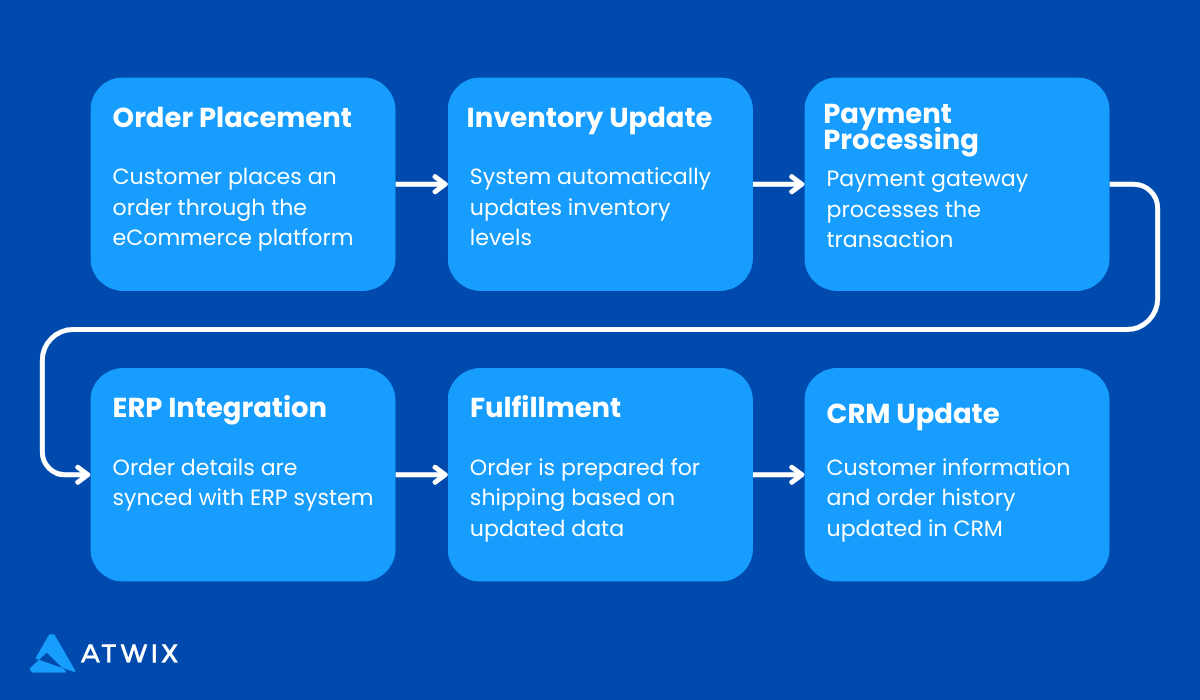
Types of Integrated Systems for B2B eCommerce
✔ eCommerce ERP Integration – Syncs financial data, inventory, and order management for accurate reporting.
✔ CRM Integration – Bridges customer data with sales and marketing, ensuring personalized experiences.
✔ Payment Gateway Integration – Provides secure and flexible payment options, including automated billing.
✔ Shipping Integration – Automates order fulfillment, tracking, and returns to improve logistics.
✔ Marketplace Integration – Connects your store with Amazon, eBay, and other marketplaces, expanding reach.
Why Integrated eCommerce Matters for B2B Companies
B2B businesses deal with large order volumes, complex pricing structures, and multiple sales channels. Without integration, data silos create inefficiencies, leading to errors, miscommunication, and revenue loss. By using integrated systems for B2B, companies can improve efficiency, customer satisfaction, and scalability.
Key Benefits of Integrated eCommerce for B2B Companies
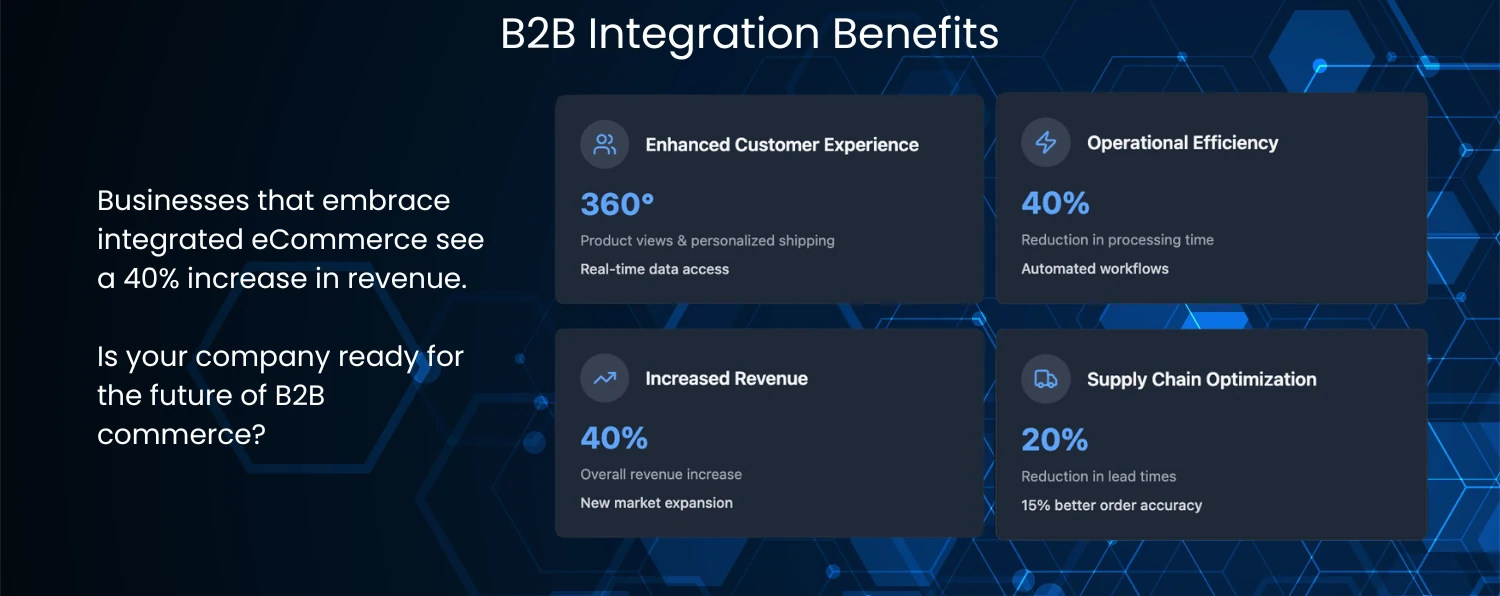
Integrated eCommerce isn’t just about automating processes—it’s about transforming the way B2B companies sell, operate, and grow. By bringing together critical business systems, companies can improve efficiency, customer satisfaction, and revenue generation. Here’s a look at the top benefits of integrated eCommerce for B2B companies.
Enhanced Customer Experience
Let’s be honest: customer experience is everything, especially in B2B. You’re not just selling products; you’re building long-term relationships. Integrated eCommerce platforms are your secret weapon for delivering personalized, responsive service that keeps customers coming back.
Real-Time Data Access: With integrated eCommerce, you get real-time access to customer data—every interaction, every preference, every purchase history. This allows you to offer personalized recommendations, targeted promotions, and customized pricing right when it matters most.
Personalized Service: Personalization goes beyond just using a customer’s name in an email. It’s about offering the right product or service at exactly the right time. Integrated eCommerce lets you tailor your offerings to match each customer’s unique needs and preferences, building stronger relationships and encouraging repeat business.
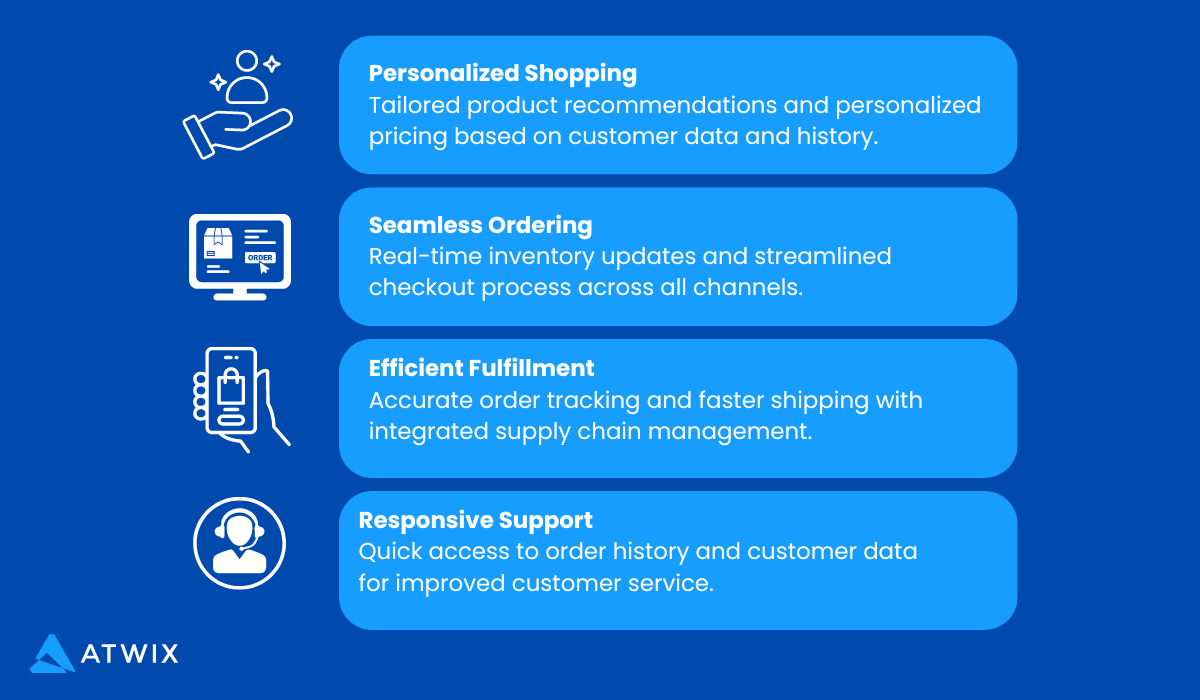
Client Success Example: Byrne Electrical Specialists
Atwix helped Byrne Electrical Specialists by implementing a fully integrated Adobe Commerce (Magento) platform, seamlessly connecting their ERP system with their eCommerce operations. This integration not only streamlined their order processing and enhanced customer experiences but also made their operations run smoother. With features like 360-degree product views and customized shipping options, Byrne’s customers enjoyed a truly personalized experience.
Atwix believes personalization is key to building long-term customer relationships. By using real-time data, we help businesses create experiences that are both meaningful and memorable
VP of Digital Transformation at Atwix.
Want to up your customer experience game? Reach out to Atwix to see how our integrated eCommerce solutions can help you create personalized, impactful interactions with your customers.
Increased Revenue
Who doesn’t want to see their revenue grow? Integrated eCommerce platforms are powerful tools for boosting your bottom line. By automating sales processes, expanding your market reach, and improving customer experience, you can take your business to new heights.
Expanding Market Reach: Integrated eCommerce makes it a breeze to enter new markets. Whether you’re expanding within your country or going global, these platforms let you manage multiple sales channels from one central system, not only saving time but also ensuring consistency in your brand messaging and customer experience.
Automating Sales Processes: Automation is a key driver of revenue. Integrated eCommerce platforms handle repetitive tasks like order processing, inventory updates, and invoicing automatically, reducing the need for manual work, minimizing errors, and speeding up the entire sales process. This means customers get their orders faster, and you close deals quicker.
Atwix Success Story:
Atwix recently worked with a global manufacturer struggling to manage sales across multiple regions. By implementing an integrated eCommerce platform, we helped them streamline operations and enter three new markets in just six months. The result? A 40% increase in overall revenue. That’s the power of integration.
Scalability
As your business grows, so do your challenges. Scaling up can feel like a daunting task, but integrated eCommerce platforms are built to make it easier. They’re designed with growth in mind, ensuring that your systems can handle increased demand, more complex operations, and larger product catalogs without missing a beat.
Handling Increased Traffic: Whether you’re running a seasonal promotion or expanding into new markets, your eCommerce platform needs to stay strong under pressure. Integrated platforms are robust, allowing your customers to enjoy a smooth, uninterrupted experience—even during the busiest times.
Supporting Larger Product Catalogs: As your business expands, so does your product lineup. Managing a growing product catalog across multiple channels can be overwhelming, but with integrated eCommerce platforms, it’s a breeze. You can handle everything from one system, saving time and ensuring your brand remains consistent.
Atwix Involvement:
Atwix has a proven track record of helping clients scale their eCommerce operations effectively. We’ve implemented scalable platforms for businesses managing millions of products, enabling them to handle large catalogs, manage increased traffic, and confidently expand into new markets. Our clients have seen significant improvements in both efficiency and revenue growth.
Operational Efficiency
Operational efficiency isn’t just a buzzword—it’s the backbone of any successful business. Integrated eCommerce platforms take efficiency to the next level by syncing data across systems, automating routine tasks, and drastically cutting down on errors. When your operations are smooth, you can deliver better results faster and at a lower cost.
Data Synchronization: Integrated eCommerce platforms make sure data flows seamlessly between systems in real-time. This means everyone in your organization—from sales to logistics—has access to the same, up-to-date information. No more scrambling to find the right data; everything is synchronized and ready when you need it.
Reduced Manual Errors: Let’s be honest: manual data entry is slow and prone to mistakes. Even small errors can cause big headaches, like stockouts, overstocking, or inaccurate financial reports. Integrated eCommerce platforms automate these tasks, reducing the risk of errors and freeing up your team to focus on more strategic activities.
Real-World Example: A B2B company partnered with Atwix to integrate their eCommerce platform. Before integration, they constantly dealt with inventory discrepancies and order processing delays due to manual errors. After integration, they saw a 40% reduction in processing time and significantly fewer errors. This led to faster deliveries, happier customers, and lower operational costs.
Streamlined Supply Chain

In the B2B world, a streamlined supply chain isn’t just a nice-to-have—it’s essential for maintaining efficiency and meeting customer expectations. Integrated eCommerce solutions optimize supply chain management by improving coordination among suppliers, manufacturers, and distributors.
Enhanced Coordination: Integrated eCommerce platforms allow real-time communication and data sharing among all parties in your supply chain, from suppliers to logistics providers. When everyone’s on the same page, it’s easier to coordinate activities, forecast demand, and ensure timely deliveries.
Accurate Inventory Levels: Keeping accurate inventory levels is key to a smooth supply chain. Integrated eCommerce platforms sync inventory data across multiple systems, so your stock levels are always up to date. This helps prevent overstocking and stockouts, reducing carrying costs and ensuring customer orders are fulfilled promptly.
Efficient Order Processing: Automation is a game-changer when it comes to order processing. Integrated eCommerce platforms can automate many steps involved in order fulfillment, from processing payments to generating shipping labels. This reduces manual effort and speeds up the entire process, leading to faster turnaround times and a more reliable supply chain.
Atwix’s Role: Atwix has successfully implemented integrated solutions that streamline supply chains for clients across various industries. For example, one of our clients, a global distributor, saw a 20% reduction in lead times and a 15% improvement in order accuracy after integrating their eCommerce platform with their supply chain systems. These improvements resulted in faster deliveries, lower costs, and higher customer satisfaction.
Better Data Management

Data is the lifeblood of your business. Managing and analyzing it effectively can make the difference between success and failure. Integrated eCommerce platforms offer centralized data management, giving you a complete view of your operations. This leads to smarter decision-making, better financial reporting, and deeper insights into customer behavior.
Centralized Data Management: With an integrated eCommerce platform, all your data is stored in one central location. No more juggling multiple databases or dealing with discrepancies. Whether it’s inventory data, customer information, or financial records, everything is accessible from one system.
Improved Inventory Management: Inventory management is critical for any B2B business. Integrated eCommerce platforms provide real-time visibility into inventory levels, allowing you to optimize stock, reduce carrying costs, and avoid stockouts.
Enhanced Financial Reporting: Financial reporting can be a headache, especially when data is spread across multiple systems. Integrated eCommerce platforms automate the collection and analysis of financial data, making it easier to generate accurate and timely reports. This not only reduces the workload on your finance team but also provides the insights needed for strategic decision-making.
Customer Data Analysis: Understanding your customers is key to driving sales. Integrated eCommerce systems offer deep insights into customer preferences, purchase history, and engagement patterns. This data can be used to tailor your marketing strategies, optimize product offerings, and deliver personalized experiences that resonate with your customers.
Atwix Case Study: Byrne Electrical Specialists
Atwix has a proven track record of helping clients achieve remarkable results through tailored data management and eCommerce solutions. One of our standout success stories is our partnership with Byrne Electrical Specialists. They were facing the challenge of launching a new B2B portal within just eight weeks and turned to Atwix for help.
We implemented a fully integrated Adobe Commerce (Magento) platform that seamlessly connected Byrne’s ERP system with their eCommerce operations. This integration enabled automated order processing, improved customer experiences, and streamlined their overall operations. Key features included 360-degree product views, non-catalog product functionality, and customized shipping options. As a result, Byrne saw an increase in sales and significantly enhanced customer satisfaction. Plus, the new platform allowed Byrne’s team to shift their focus from manual processes to innovation and growth.
Our partnership didn’t stop at the launch. Atwix continues to support Byrne with ongoing digital initiatives, ensuring they stay ahead in their market. This long-term collaboration has solidified Byrne’s position as a leader in their industry.
Case Studies on Integrated eCommerce for B2B
Implementing integrated eCommerce solutions has been transformative for many B2B companies, enhancing operational efficiency and driving significant growth. Below are examples of successful B2B integrated eCommerce implementations:
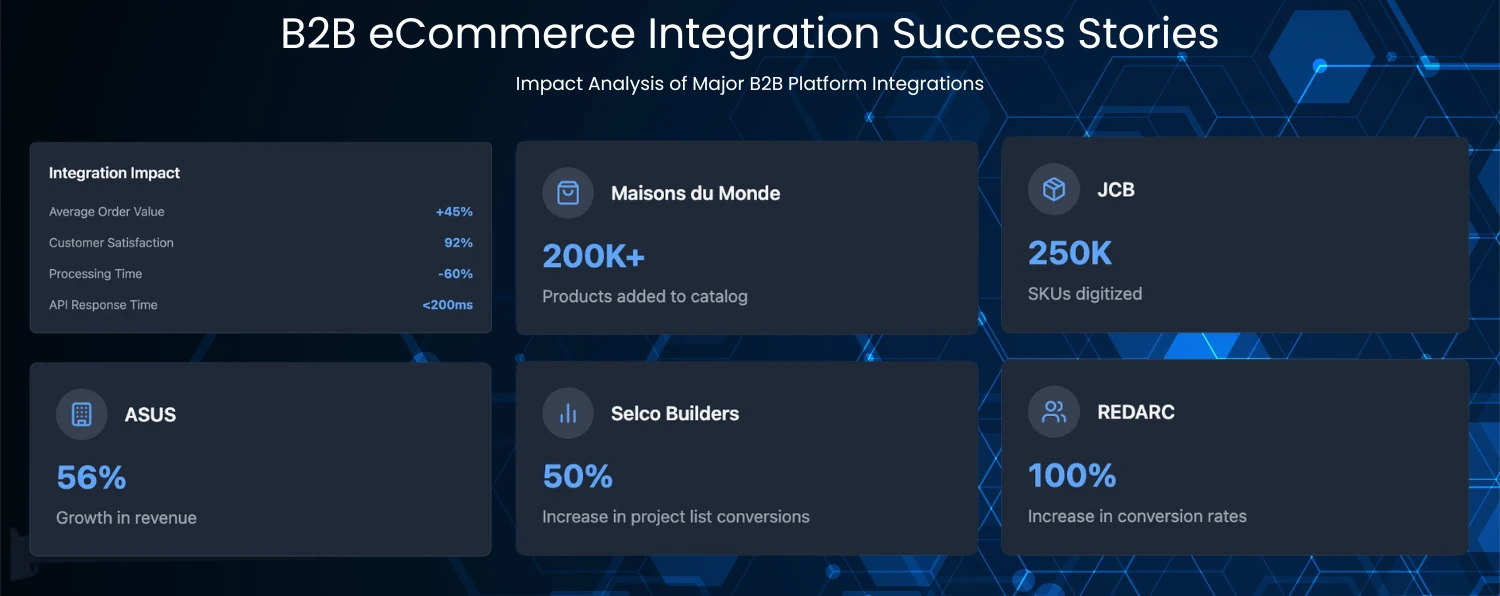
1. Maisons du Monde: Harmonizing Omnichannel eCommerce
Maisons du Monde, a European leader in furniture and home decor, sought to harmonize their online and in-store customer experiences. By integrating their digital platform with Adobe Commerce, they achieved:
- Expanded Product Catalog: Increased offerings by over 200,000 products through a marketplace integration.
- Enhanced In-Store Experience: Developed an app providing sales staff with access to the extended online catalog, improving customer service.
- Optimized Delivery Management: Implemented efficient handling of mixed baskets and delivery notes, enhancing logistics.
This integration led to improved customer insights and created new synergies between B2C and B2B customers.
2. Selco Builders Warehouse: Innovating with a B2B Sales App
Selco Builders Warehouse, a British builders merchant, recognized the need to cater to busy tradespeople constantly on the move. Collaborating with Adobe Commerce, they developed the “Selco Project Tool” app, which offers:
- Project Management On-the-Go: Allows tradespeople to manage projects, create shopping lists, and request quotes directly from job sites.
- Offline Functionality: Enables use in areas with limited connectivity, ensuring continuous access to essential tools.
- Increased Engagement: Achieved a 50% increase in project list conversions, reflecting enhanced user interaction.
This innovation streamlined the purchasing process and significantly boosted online engagement.
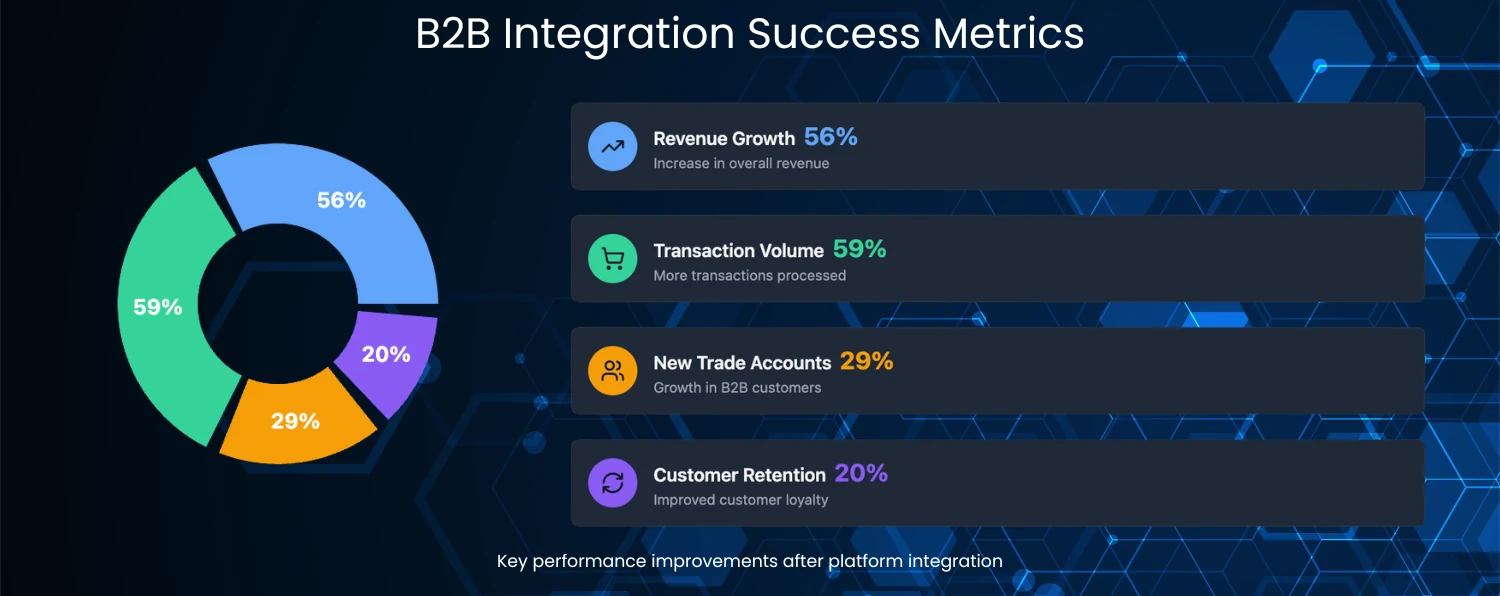
3. JCB: Building a Robust B2B Sales Platform
JCB, one of the world’s top manufacturers of construction equipment, aimed to simplify the purchasing process for their extensive parts catalog. By integrating with Adobe Commerce, they accomplished:
- Comprehensive Online Catalog: Digitized 250,000 SKUs, making it easier for customers to find and purchase parts.
- Personalized Dealer Sites: Utilized multi-store functionality to create individual sites for dealers, integrating with their ERP systems.
- Improved Customer Retention: Converted 20% of new customers into repeat buyers through an enhanced online experience.
This strategic move positioned JCB at the forefront of technology in the construction machinery sector.
4. REDARC Electronics: Scaling Global B2B and B2C eCommerce
REDARC Electronics, specializing in vehicular and mobile power products, sought to unify their eCommerce platforms for global expansion. Partnering with Adobe Commerce, they achieved:
- Unified Platform: Consolidated separate websites into a single platform, streamlining operations across regions.
- Enhanced B2B Features: Introduced functionalities like Quick Order and Requisition Lists, expediting the purchasing process for trade customers.
- Significant Growth Metrics: Experienced a 100% increase in conversion rates and a 29% growth in new trade customer accounts.
This integration facilitated efficient order processing and supported REDARC’s global expansion efforts.
5. ASUS: Merging B2C and B2B eCommerce
ASUS, a leading technology brand, aimed to enhance both consumer and reseller experiences through a unified eCommerce platform. By implementing Adobe Commerce, they realized:
- Customized Shopping Experience: Allowed customers to design and order personalized gaming PCs and laptops.
- Streamlined Reseller Operations: Integrated resellers’ ERP systems, automating revenue distribution and improving inventory tracking.
- Impressive Financial Results: Achieved a 56% growth in revenue and a 59% increase in transactions post-launch.
This approach strengthened ASUS’s market position and fostered closer relationships with resellers.
Conclusion
Integrated eCommerce solutions are essential for B2B companies looking to stay competitive in a rapidly evolving market. From improving operational efficiency and streamlining supply chains to enhancing data management and increasing revenue, the benefits are clear. More importantly, B2B eCommerce solutions for better customer experience enable businesses to deliver seamless transactions, personalized service, and real-time updates, strengthening customer relationships and driving long-term growth.
As digital transformation accelerates, having a robust, scalable, and fully integrated eCommerce platform is no longer optional—it’s a necessity. Atwix specializes in helping businesses implement cutting-edge solutions, ensuring a smooth, efficient, and customer-centric online experience.
🚀 Ready to take your B2B eCommerce strategy to the next level? Contact Atwix today to explore how our tailored integrated eCommerce solutions can streamline your operations, enhance customer satisfaction, and boost your bottom line.
Frequently Asked Questions
Got some questions? We’re here to answer. If you don’t see your question here, drop us a line with out Contact form.
Can integrated eCommerce help us reduce manual errors in order processing?
Yes, integrated eCommerce platforms significantly reduce manual errors in order processing by automating workflows and ensuring data synchronization across systems. For example, customer orders, inventory updates, and invoicing are handled automatically, eliminating the risk of mistakes caused by manual entry. This not only enhances accuracy but also improves efficiency, allowing your team to focus on strategic tasks rather than administrative ones.
What specific supply chain benefits can we expect from eCommerce integration?
Integrated eCommerce platforms optimize supply chain operations by enhancing coordination among suppliers, distributors, and logistics providers. Key benefits include real-time inventory tracking, automated order processing, and improved demand forecasting. These features reduce lead times, prevent stockouts, and ensure timely deliveries, all of which contribute to a more efficient and cost-effective supply chain.
How do integrated eCommerce platforms improve inventory management in B2B?
Integrated eCommerce platforms provide real-time visibility into inventory levels, ensuring that stock data is accurate across all channels. This centralized system helps businesses avoid overstocking or stockouts, optimize warehouse management, and align inventory with customer demand. Advanced analytics further support smarter purchasing decisions and streamlined inventory planning.
Can our company use integrated eCommerce to support a larger product catalog?
Absolutely. Integrated eCommerce platforms are designed to handle the complexities of managing large product catalogs. They enable seamless organization, categorization, and updating of product data across multiple sales channels. This scalability ensures that as your catalog grows, your platform remains efficient and user-friendly, delivering a consistent shopping experience to your customers.
